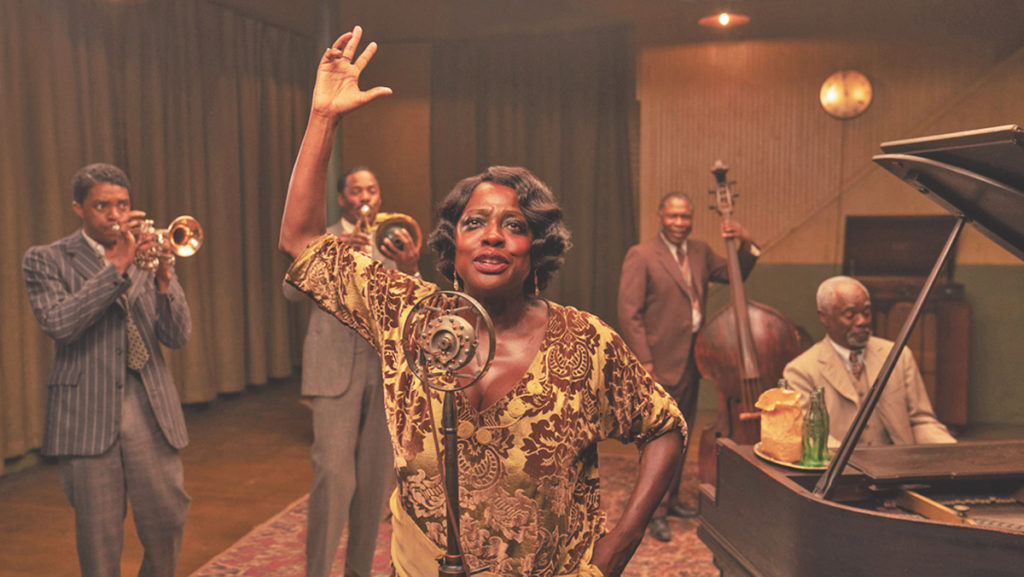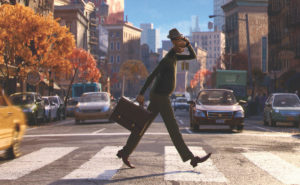
August Wilson’s Pittsburgh cycle of 10 plays, one for each decade of the 20th century, is a towering achievement, chronicling the history of African-American life through powerful, personal storytelling. Now, Netflix has premiered a film adaptation of one of those plays, Ma Rainey’s Black Bottom, produced by Denzel Washington, who memorably directed and starred in the movie version of Fences, another work in Wilson’s cycle.
Ma Rainey’s Black Bottom is set in the 1920s, at a recording session in Chicago — it’s the only cycle play taking place outside Pittsburgh’s Hill District — of the real-life blues singer Ma Rainey, an imperious and enormously talented artist who shrewdly and unforgivingly navigated her groundbreaking success and enjoyed its trappings despite the obstacles of racism.
In the movie, directed by George C. Wolfe, former head of the Public Theater and a Broadway veteran, Viola Davis plays Rainey with a fat suit, shiny metal teeth, and ample contempt. It’s a meaty, transformational role for the Oscar winner, but far more static than that of Levee, Rainey’s ambitious cornet player, in which a wiry Chadwick Boseman, only months away from his untimely death from colon cancer, delivers his last and most breathtaking performance.
Levee, like a spirit arising from Jim Crow terror, wants to dazzle in his solos and plans to have a band of his own. In his scenes with Rainey’s band, the wisdom and adaptive restraint of pianist Toledo (Glynn Turman), trombonist Cutler (Colman Domingo), and bass player Slow Drag (Michael Potts) are poignant and portentous.
All the actors are a joy to watch, and when Ma Rainey shows up late, insisting that her stuttering nephew (Dusan Brown) introduce her song, requiring multiple takes, and eyeing the shaking booty of her flirtatious young female companion (Taylour Paige), things in that stuffy recording studio heat up. Wolfe, as is his wont, nervously punches up the action, but he brings the best out of his cast. The play, with language that poetically embodies the aching beauty of the blues, is a masterwork on the plane of O’Neill.

The new Pixar animated film Soul, its opening delayed from earlier this year by Covid, is available locally only on the online network Disney+, which requires a subscription ($6.99 a month). It’s a lovely, thoughtful, and moving film, inspiring for older children and satisfying for adults.
The subject of Soul is jazz and the meaning of life, in that order. Joe Gardner (with the voice of Jamie Foxx and the music of Jon Batiste) is a New York jazz pianist who teaches music in public school and privately at home. Just as he gets the big break he’s looking for — a regular gig with a jazz quartet — he falls into a manhole.
What happens next is a riff on old Hollywood angel-visitation movies: Joe manipulates the rules of the afterlife to return to the living. The heavens are animated like a vintage Disney instructional film: abstract line drawings for angels and human spirits like Pillsbury doughboys. In getting back to Earth, Joe is inadvertently teamed (and shares his body) with a goofy and girlish unformed spirit named 22 (voiced by Tina Fey). The life lessons learned in the film are, of course, reflected in both Joe’s and 22’s personal dramas and the connection between them.
The animation, as one might expect from Pixar, is a brilliant mix of realism and fanciful imagination, and the art direction and story are marvelously polished. It’s refreshing in an animated film to have a central black character, and to have a black milieu brought to life without exoticism, from Joe’s point of view. (Having a black co-director and co-screenwriter in Kemp Powers, a first for Pixar, surely helped.) The metaphysical themes, though typically Pixar, are nicely and unpretentiously explored. All in all, it’s worth joining Disney+ just for Soul.

The outstanding Romanian documentary Collective, no longer streaming via Waters Edge Cinema, is available for rental online through iTunes, Amazon Prime, and other channels. This nearly two-hour cinema verité film reveals devastating corruption in the Romanian health-care system by closely observing the work of investigative journalists and government reformers.
The literal spark of events in the film is the deadly fire in 2015 at the Bucharest club Colectiv during a rock concert, which was not unlike the Station nightclub fire in Rhode Island. In both, a pyrotechnic display caused a rapidly spreading fire in a crowded space without proper exits. The Romanian fire killed 27 people, but, compounding the tragedy, 37 more died of secondary infections in local hospitals.
The scandal that followed the fire forced the government to resign, and a temporary technocratic regime ran things till an election a year later. During that interim period, reporters and editors from the Sports Gazette — a surprisingly well staffed Romanian sports paper — discover that corrupt dealings between a pharmaceutical disinfectant supplier and hospitals turned burn units into killing fields.
The film then shifts to covering the efforts of the idealistic new health minister to reform the system and report honestly to the press. What is revealed is occasionally disturbing (maggots and burn wounds) and disillusioning (suspicious suicides and cynical politics), but always riveting. And for Americans in the Trump era, Collective is both instructive and painfully familiar, especially when witnessing the valiant efforts of the press corps, whistleblowers, and genuine public servants.
